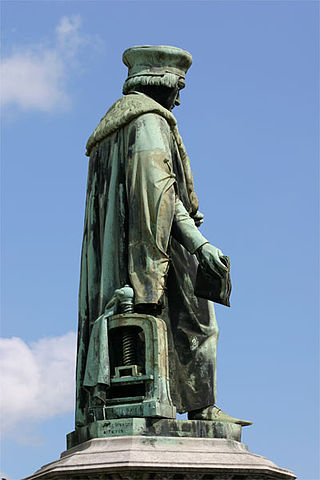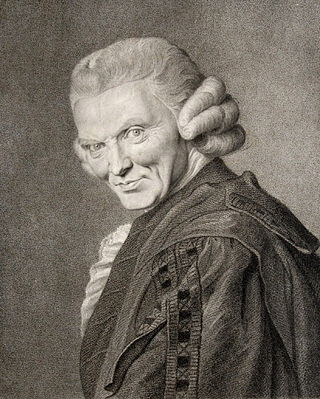Related Research Articles

Desiderius Erasmus Roterodamus was a Dutch philosopher and Catholic theologian who is considered one of the greatest scholars of the northern Renaissance. As a Catholic priest, he was an important figure in classical scholarship who wrote in a pure Latin style. Among humanists he was given the sobriquet "Prince of the Humanists", and has been called "the crowning glory of the Christian humanists". Using humanist techniques for working on texts, he prepared important new Latin and Greek editions of the New Testament, which raised questions that would be influential in the Protestant Reformation and Catholic Counter-Reformation. He also wrote On Free Will,In Praise of Folly, Handbook of a Christian Knight, On Civility in Children, Copia: Foundations of the Abundant Style and many other works.

Thomas Linacre or Lynaker was an English humanist scholar and physician, after whom Linacre College, Oxford, and Linacre House, a boys' boarding house at The King's School, Canterbury, are named.

Sir John Cheke was an English classical scholar and statesman. One of the foremost teachers of his age, and the first Regius Professor of Greek at the University of Cambridge, he played a great part in the revival of Greek learning in England. He was tutor to Prince Edward, the future King Edward VI, and also sometimes to Princess Elizabeth. Of strongly Reformist sympathy in religious affairs, his public career as provost of King's College, Cambridge, Member of Parliament and briefly as Secretary of State during King Edward's reign was brought to a close by the accession of Queen Mary in 1553. He went into voluntary exile abroad, at first under royal licence. He was captured and imprisoned in 1556, and recanted his faith to avoid death by burning. He died not long afterward, reportedly regretting his decision.

Richard Foxe was an English churchman, the founder of Corpus Christi College, Oxford. He was successively Bishop of Exeter, Bath and Wells, Durham, and Winchester, and became also Lord Privy Seal.
Simon Grynaeus was a German scholar and theologian of the Protestant Reformation.
Thomas Ruthall was an English churchman, administrator and diplomat. He was a leading councillor of Henry VIII of England.
John Palsgrave was a priest of Henry VIII of England's court. He is known as a tutor in the royal household, and as a textbook author.
Richard Croke was an English classical scholar, and a royal tutor and agent.

Dirk Martens was a printer and editor in the County of Flanders. He published over fifty books by Erasmus and the very first edition of Thomas More's Utopia. He was the first to print Greek and Hebrew characters in the Netherlands. In 1856 a statue of Martens was erected on the main square of the town of his birth, Aalst.
Walter Haddon LL.D. (1515–1572) was an English civil lawyer, much involved in church and university affairs under Edward VI, Queen Mary, and Elizabeth I. He was a University of Cambridge humanist and reformer, and was highly reputed in his time as a Latinist. He sat as an MP during the reigns of Mary and Elizabeth. His controversial exchange with the Portuguese historian Jerónimo Osório attracted international attention partly on account of the scholarly reputations of the protagonists.
Leonard Cox was an English humanist, author of the first book in English on rhetoric. He was a scholar of international reputation who found patronage in Poland, and was friend of Erasmus and Melanchthon. He was known to contemporaries as a grammarian, rhetorician, poet, and preacher, and was skilled in the modern as well as the classical languages.
Richard Whitford was a 16th century English Catholic priest known as an author of many devotional works.

Andrew Willet was an English clergyman and controversialist. A prolific writer, he is known for his anti-papal works. His views were conforming and non-separatist, and he appeared as a witness against Edward Dering before the Star-chamber. Joseph Hall eulogised Willet in Noah's Dove, and Thomas Fuller modelled 'the Controversial Divine' of his Holy State on him.
Thomas Gerard (1500?–1540) was an English Protestant reformer. In 1540, he was burnt to death for heresy, along with William Jerome and Robert Barnes.
John Siberch was the first Cambridge printer and an associate of Erasmus.
Edward Lee was Archbishop of York from 1531 until his death.

Thomas Elrington was an Irish academic and bishop. He was Donegall Lecturer in Mathematics (1790-1795) at Trinity College Dublin (TCD). While at TCD he also served as Erasmus Smith's Professor of Mathematics (1795–1799) and as Erasmus Smith's Professor of Natural and Experimental Philosophy (1799–1807). Later, he was Provost of Trinity College Dublin (1811-1820), then Bishop of Limerick, Ardfert and Aghadoe (1820-1822), and finally Bishop of Ferns and Leighlin till his death in Liverpool in 1835.

Robert Glynn, afterwards Clobery was an English physician, known as a generous eccentric.

John Davies (1679–1732) was an English cleric and academic, known as a classical scholar, and President of Queens' College, Cambridge from 1717.
Samuel Winter DD (1603–1666) was an English clergyman and academic, who became Provost of Trinity College Dublin.
References
 This article incorporates text from a publication now in the public domain : "Bullock, Henry". Dictionary of National Biography . London: Smith, Elder & Co. 1885–1900.
This article incorporates text from a publication now in the public domain : "Bullock, Henry". Dictionary of National Biography . London: Smith, Elder & Co. 1885–1900.